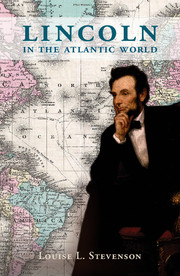Book contents
- Frontmatter
- Dedication
- Contents
- Acknowledgments
- Introduction: My Lincoln Lessons
- 1 The Second Shot Heard ’Round the World
- 2 African Lessons
- 3 European Lessons
- 4 German Lessons
- 5 English Lessons
- 6 Lessons from International Law
- 7 German Lessons for Reelection
- 8 The Last Lesson
- Notes
- Selected Bibliography
- Index
Introduction: My Lincoln Lessons
Published online by Cambridge University Press: 05 November 2015
- Frontmatter
- Dedication
- Contents
- Acknowledgments
- Introduction: My Lincoln Lessons
- 1 The Second Shot Heard ’Round the World
- 2 African Lessons
- 3 European Lessons
- 4 German Lessons
- 5 English Lessons
- 6 Lessons from International Law
- 7 German Lessons for Reelection
- 8 The Last Lesson
- Notes
- Selected Bibliography
- Index
Summary
In his speeches, President Lincoln frequently placed the United States in a global context. Readers often take these mentions as rhetorical flourishes that he used to surround his words with an aura of consequence. Consider his speech at Gettysburg, Pennsylvania, on November 19, 1863. Standing on a platform beside the new national cemetery, the president orated phrases that continue to resonate and define the basis of republicanism in the United States: “that government of the people, by the people, for the people, shall not perish from the earth.”
Before the platform on that sunny day, 15,000 people stood near and among the newly shoveled graves of Union soldiers. Collected from the battlefield by gravediggers, many of whom were free African Americans, the soldiers’ remains now rested in burial plots forming concentric semicircles. At the focal point, a monument with the statue “Genius of Liberty” on a towering pedestal would be placed in 1869. The orderliness of cemetery design had replaced the chaos and carnage of war. Mortally wounded during the great battle of the previous July, the soldiers had fallen in gruesome postures that defaced the town – its streets, house yards, and farm fields. To dedicate the cemetery, President Lincoln's address now transformed the corpses interred in their symmetrically arranged mounds into the “honored dead” whose sacrifice called for increased devotion to a great cause.
In his salient concluding sentence, the president explained that cause. The loss of each of the approximately 3,200 Union soldiers had mattered to the United States and to the world. They “had died that that nation might live.”
In the present day, readers of Lincoln's well-known speech tend to emphasize his three prepositional phrases that sum up the central propositions of republican government: that governments depend on the consent of the governed and that they exist to serve those whom they govern. Readers then move quickly to the end of the sentence while overlooking why the president said that republican government, and in particular the republican government of the United States, possessed global importance. U.S. soldiers had died so that their national government should not perish, and even more, so that republican government should “not perish from the earth.” For Abraham Lincoln, the outcome of the Civil War would determine the fate of republicanism both nationally and globally, in 1865 and for all time.
- Type
- Chapter
- Information
- Lincoln in the Atlantic World , pp. 1 - 13Publisher: Cambridge University PressPrint publication year: 2015

